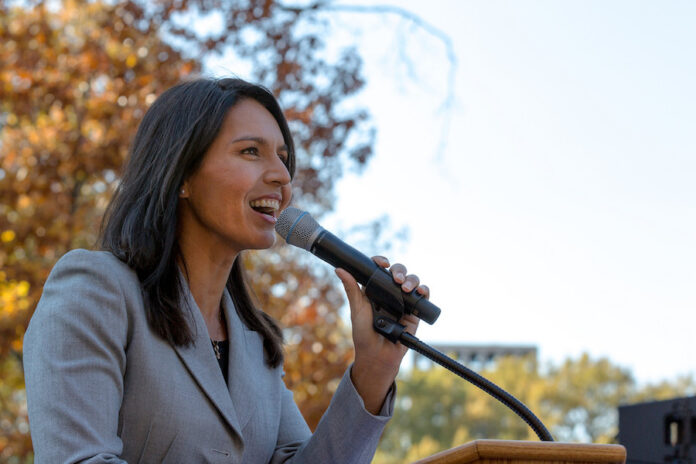A populist progressive enters the presidential race
You may have missed it among the many Democrats who declared their presidential bids this month, but Hawaii Congresswoman Tulsi Gabbard has voiced her intention to run for the highest office in the land — and she may be the most interesting candidate yet.
A young, charismatic woman of color from a multicultural background, Gabbard checks all the boxes for 21st-century political appeal. Her father is a Hawaii state senator and a Catholic of Samoan descent, while her mother, of European descent, is Hindu. Gabbard eventually became the first Hindu lawmaker in congressional history and is currently one of four female combat veterans in Congress. Gabbard offers a brand of progressive, yet often bipartisan, politics. Most Democrats, however, have all but ignored her candidacy, and when she comes into frame, much of her coverage is negative. It begs the question: just what has she done to invoke such a response?
Gabbard resigned as a Vice Chair of the Democratic National Committee in 2016 to endorse Bernie Sanders for the Democratic presidential nomination — perhaps her most egregious offense in the eyes of the party establishment. It was Gabbard’s refusal to endorse eventual candidate Hillary Clinton, who allegedly ran a corrupt campaign, that speaks volumes to her ideological commitment. Unsurprisingly, Gabbard’s other attempts at crossing party lines — from her anti-war meeting with then President-elect Donald Trump to her reluctance to assign one-dimensional partisan blame for the current government shutdown — have likewise drawn the ire of Democratic Party elites. It’s her ability to reach across the aisle, a rare skill in today’s polarized political atmosphere, that provides her with broad political appeal.
Gabbard’s foreign policy is also among her most appealing platforms to voters. Gabbard, who has described herself as a “hawk on terror, dove on regime change,” has drawn extensive criticism for her 2017 meeting with Syrian President Bashar al-Assad. The purpose of that meeting, to broker a humanitarian resolution to the Syrian Civil War, was quickly eschewed from the narrative of those who wished to paint Gabbard as an Assad apologist — a ridiculous accusation considering her previous comments characterizing the Syrian leader as a “brutal dictator.”
Ironically, it’s Gabbard’s diplomatic approach to foreign policy, which now draws heavy party criticism, that was once a mainstream position in the Democratic Party. In 2004, Democratic frontrunner John Kerry was heavily critical of what he saw as the Bush administration’s aggressive, unilateral approach to a regime change in Iraq. In 2008, eventual President Barack Obama stated his willingness to meet with the leaders of countries such as Iran, Cuba and North Korea. Gabbard’s opposition to the consistently disastrous practice of regime changes in the Middle East should be a commonsense proposal among progressives. Yet she is criticized for these positions by an increasingly hawkish Democratic Party, a party that seems ever more concerned with petty political spats than legitimate policy proposals. Nevertheless, Gabbard has remained ideologically committed to ending America’s various foreign policy blunders. In 2017, she introduced House legislation aimed at ending America’s funding of suspected terror groups via the aptly named Stop Arming Terrorists Act.
Elsewhere, Gabbard’s platform outlines a compelling variety of progressive causes. While foreign policy has been the centerpiece of her campaign, she has also placed heavy emphasis on criminal justice reform, health care access and climate change. Gabbard’s congressional record on environmental issues is particularly strong; she has received endorsements from the Sierra Club and the League of Conservation Voters and played a key leadership role in the protest against the Dakota Access Pipeline.
In a crowded primary field, it remains to be seen just how far Gabbard’s insurgent, anti-establishment campaign will go. But at the very least, it can be assured that Gabbard’s emphasis on foreign policy reform will help realign the tendencies of a hawkish party establishment, while her campaign organization will pave the way for a legitimate left-populist movement in the post-Trump era. Irrespective of your views, Congresswoman Gabbard is worth your attention. Don’t count her out.
Written by: Brandon Jetter — brjetter@ucdavis.edu
Disclaimer: The views and opinions expressed by individual columnists belong to the columnists alone and do not necessarily indicate the views and opinions held by The California Aggie.





Thank you for showing your support for Rep. Tulsi Gabbard. The media likes to remind us of how “flawed” she is as a candidate (much of it in the form of blatant propaganda like the recent NBC article), but they rarely point out the positives that were reflected in her campaign launch speech. The problem for them is that what we progressives admire most about Gabbard is what the corporate elites find threatening about her. Her staunch opposition to regime-change wars alone is enough to compel them to attack her. Can you imagine someone like Tulsi Gabbard as our President? JFK had wanted to get us completely out of Vietnam by the end of 1965, and had he served a second term, that is quite likely what he might have accomplished. The military-industrial complex was extremely committed to war then and still is today. Gabbard is very brave to confront it head-on like this. We need to support this important goal of hers to end the madness. Americans need to show that we’ve had enough and no longer believe that these military operations are keeping our country or our allies safe as they’d like us to think.
Great article. Obviously, you’re not receiving $$$ from george Soros.